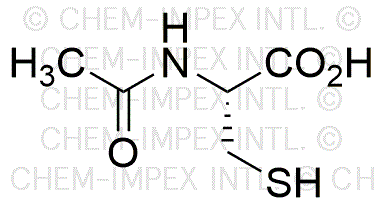Acetyl-L-cysteine is widely utilized in research focused on various practical applications across multiple industries:
- Pharmaceuticals: It is commonly used as a mucolytic agent to help break down mucus in patients with respiratory conditions, improving lung function and facilitating easier breathing.
- Antioxidant Support: This compound acts as a powerful antioxidant, helping to protect cells from oxidative stress, which is beneficial in conditions like chronic obstructive pulmonary disease (COPD) and other inflammatory diseases.
- Detoxification: Acetyl-L-cysteine is employed in clinical settings as an antidote for acetaminophen (paracetamol) overdose, effectively replenishing glutathione levels in the liver and preventing damage.
- Cosmetics and Skincare: Its antioxidant properties make it a popular ingredient in skincare products, where it helps to protect the skin from environmental damage and promotes a healthier appearance.
- Research Applications: In laboratories, it is utilized in various biochemical studies, including those investigating cellular processes and the effects of oxidative stress, providing insights into disease mechanisms and potential therapeutic strategies.
General Information
Properties
Safety and Regulations
Applications
Acetyl-L-cysteine is widely utilized in research focused on various practical applications across multiple industries:
- Pharmaceuticals: It is commonly used as a mucolytic agent to help break down mucus in patients with respiratory conditions, improving lung function and facilitating easier breathing.
- Antioxidant Support: This compound acts as a powerful antioxidant, helping to protect cells from oxidative stress, which is beneficial in conditions like chronic obstructive pulmonary disease (COPD) and other inflammatory diseases.
- Detoxification: Acetyl-L-cysteine is employed in clinical settings as an antidote for acetaminophen (paracetamol) overdose, effectively replenishing glutathione levels in the liver and preventing damage.
- Cosmetics and Skincare: Its antioxidant properties make it a popular ingredient in skincare products, where it helps to protect the skin from environmental damage and promotes a healthier appearance.
- Research Applications: In laboratories, it is utilized in various biochemical studies, including those investigating cellular processes and the effects of oxidative stress, providing insights into disease mechanisms and potential therapeutic strategies.
Documents
Safety Data Sheets (SDS)
The SDS provides comprehensive safety information on handling, storage, and disposal of the product.
Product Specification (PS)
The PS provides a comprehensive breakdown of the product’s properties, including chemical composition, physical state, purity, and storage requirements. It also details acceptable quality ranges and the product's intended applications.
Certificates of Analysis (COA)
Search for Certificates of Analysis (COA) by entering the products Lot Number. Lot and Batch Numbers can be found on a product’s label following the words ‘Lot’ or ‘Batch’.
*Catalog Number
*Lot Number
Certificates Of Origin (COO)
This COO confirms the country where the product was manufactured, and also details the materials and components used in it and whether it is derived from natural, synthetic, or other specific sources. This certificate may be required for customs, trade, and regulatory compliance.
*Catalog Number
*Lot Number
Safety Data Sheets (SDS)
The SDS provides comprehensive safety information on handling, storage, and disposal of the product.
DownloadProduct Specification (PS)
The PS provides a comprehensive breakdown of the product’s properties, including chemical composition, physical state, purity, and storage requirements. It also details acceptable quality ranges and the product's intended applications.
DownloadCertificates of Analysis (COA)
Search for Certificates of Analysis (COA) by entering the products Lot Number. Lot and Batch Numbers can be found on a product’s label following the words ‘Lot’ or ‘Batch’.
*Catalog Number
*Lot Number
Certificates Of Origin (COO)
This COO confirms the country where the product was manufactured, and also details the materials and components used in it and whether it is derived from natural, synthetic, or other specific sources. This certificate may be required for customs, trade, and regulatory compliance.


